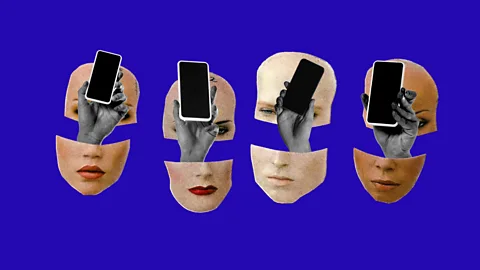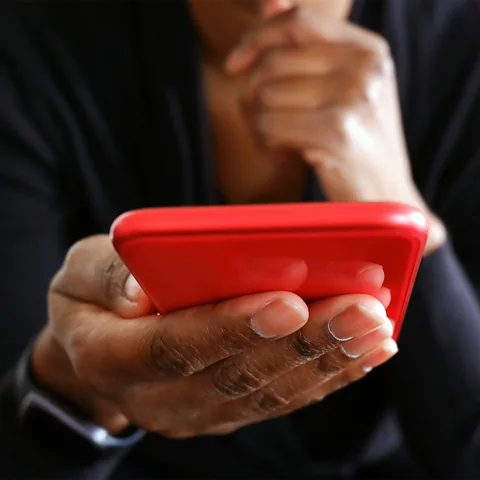'This app became my best friend': Mourning is human. New grief apps want to 'optimise' it for you
 Serenity Strull/ BBC/ Getty Images
Serenity Strull/ BBC/ Getty ImagesPeople are turning to 'grief apps' to cope with the loss of family and friends. But the new world of death data raises troubling questions.
When Nitika's father passed away unexpectedly in 2023, she was a continent away from her support system. She had moved from India to Canada only a year prior, and was the first in her friend group to grapple with the death of a parent. "Living far away from my family and dealing with this massive loss was unbearable. I often felt lost and lonely," says Nitika, who asked to withhold her full name to protect her privacy.
Then she came across an Instagram post from the grief app Untangle, which offers "personalised bereavement support" through virtual support groups and moderated forums, boosted with built-in AI features. Nitika downloaded the app. At first, she just read other people's posts, drawing strength from how others' experiences mirrored her own. The similarities made her feel less alone, and she started posting. "I mustered the courage to write about my story, and since then this app became my best friend," Nitika says.
In soothingly serifed fonts and tasteful colour palettes that are muted but never sombre, Untangle and a number of other new "grief apps", including DayNew and Empathy, seek to remake mourning for the modern era. They have the potential to democratise access to support that can otherwise be hard to find. But in doing so, privacy experts say these apps are introducing corporate technology – and all the problems of the digital age – into the vulnerability of grief.
The apps come with libraries of content dedicated to grief and mental health. Users can connect with other mourners and share photos and stories of their loved ones. Some apps offer AI features such as journaling prompts, personalised to-do lists, and advice from chatbot A few include administrative checklists and expert consultations to manage the mountain of legal and financial paperwork that comes with death.
"It's optimised healing," says Karine Nissim, co-founder of DayNew, an app that provides support for loss and other traumatic life changes. "It's essentially your therapist, your best friend and your personal assistant in your pocket, helping you see the whole journey and create one workflow for it."
But mourning is messy. It doesn't typically hew to a workflow, and some argue it shouldn't.
 Getty Images
Getty ImagesGrief apps introduce a new wrinkle to the ongoing conversation about which experiences can and should be mediated by apps and the companies behind them. Like almost all other apps, grief apps collect personal data. In the past, you might lose a loved one and decide to speak with a therapist or join an online or in-person support group. You wouldn't have to worry how information you shared was being stored, or whether details about you were being tracked and sold by your psychologist or the group facilitator. Of course, if you couldn’t pay for therapy or find a group, you might also find yourself without support of any kind.
"I think the biggest draw is that we could potentially increase access to resources that people might not otherwise have," says Adrian Aguilera, a psychologist and professor at UC Berkeley who studies digital mental health interventions. The most important thing grief apps can provide is consistency and accessibility, he says, and our pre-existing comfort with virtual interfaces can make them a natural-feeling extension of real life. "Social connection is one of the best aspects of digital technologies", especially if you don't have access to a peer or care provider.
But how much of your privacy would you trade to technology companies for accessibility, support and connection? And if grief apps replace support systems that have historically been made up of humans, does the comfort still feel the same?
How digital interfaces shape mourning
In the months after her mum died, Sofia Root, from Pennsylvania, US, felt a swirl of emotions: isolation, desperation, sorrow, anger, boredom. She was "not an online person, for the most part", Root says, but she joined a few Reddit communities based around loss. It helped a bit. "Every now and then you get that little dopamine rush when you read something you can relate to, and it just distracts you from your own issues for a minute."
Then, like Nitika, she was served an Instagram ad for Untangle. She gave the app a try, and soon noticed a comment from one of the community managers on another user's post. To Root, the comment sounded like it was written by artificial intelligence. "The idea that they might be using AI to produce something that's supposed to be about connecting with real people, it seemed a little fraudulent to me," Root says. "It goes back to that isolation."
Untangle does have AI-enabled features, including internal tools for employees, and personalised recommendations for breathing exercises and meditations. But the company maintains it doesn't use AI to respond to users' posts.
Emily Cummin, chief executive of Untangle, recalls the incident. "I spoke about it with that community manager, because she was actually horrified that someone thought that she was an AI," Cummin says. "My belief is probably that people feel a bit uncomfortable that they'd be talking to an automated system when they're at a really vulnerable time."
But the liberal sprinkling of artificial intelligence throughout grief apps can introduce doubt. When amplified by the overwhelming cycle of grief, that doubt can be enough to do damage. Root reached out to the community manager, who assured her she hadn't used AI to draft the comment, but it was all too much. Feeling betrayed, Root deleted the app. "Interacting on this stupid little smartphone, with just your thumbs? It's not gonna replace what you lost, and it's only gonna take you so far," Root says.
Root, for one, says she found more comfort speaking to other people grappling with loss than she did from a therapist. Nitika says the community she found on Untangle helped her feel heard. "We often talk to each other now, as we learn to live this life again," she says. "These people [and the] community understand me, and that was the most important part of me using this app."
Big grief meets big data
Health apps sometimes exist in a grey area when it comes to laws that regulate personal data. When you talk to a therapist in the US, the UK and the EU, for example, you can rest assured the law protects your privacy. But if you type the same information into an app that isn't connected to an official medical provider, the rules aren't always clear. And whether or not regulations are in place, once your data is collected, it can be impossible to know where it ends up next.
For example, consumer DNA testing company 23andMe lost more than 6.9 million people's data to hackers after a security lapse in 2023. That same year, the US Federal Trade Commission fined both the therapy app BetterHelp and prescription coupon company GoodRX for sharing user data with Google and other advertising companies.
"A year down the road we [could] have a discussion like, 'Oh, the data set belonging to this grief app has been hacked,'" says Murat Kantarcioglu, a professor at the University of Texas at Dallas who studies data privacy and computer science. Having consulted for tech start-ups in the past, Kantarcioglu says: "These guys are working with [venture capitalists], and at the end of the day, there are money pressures. You have to hit the milestone for your next tranche of money, you have to show some growth." If an app flounders, the company might refine its privacy policy to allow it to better monetise your data, he says.
 Getty Images
Getty ImagesBeyond those concerns, 90% of digital health startups fail within the first five years of operation. When they do, even the most privacy-minded companies may end up selling or ceding consumer data to less noble organisations, Kantarcioglu says.
Kantarcioglu is unequivocal. When it comes to grief apps, "I would never use this," he says.
There's plenty at stake. In their app store privacy disclosures, the companies say they collect everything from contact info to unique ID numbers that identify your phone. DayNew collects financial information, as do the other apps when you sign up for subscriptions. Untangle can gather location data. And using any one of these apps creates a record that you're seeking mental health support. That's in addition to the data users give them voluntarily, like mood data, photos and journal entries.
Untangle, DayNew and Empathy are firm that they don't sell or otherwise monetise user data with third parties, though they sometimes share limited information with digital advertising companies such as Google to market their own products.
Representatives from Empathy and DayNew say that if their companies were to fold, user data would not be sold unless their entire businesses were acquired by another company, in which case the information would be part of the deal. Cummin of Untangle says she hasn't considered this issue. "I haven't really thought about that, because hopefully [Untangle] won't be in that position," she says.
Aguilera says that the more urgently someone feels they need help, the more data they may be willing to give away. Still, he says that trade-off might be worthwhile if a service is truly useful – despite the serious privacy concerns.
The future of grief?
Untangle, DayNew, and Empathy all toe a line. The companies are not purporting to offer mental healthcare – which would subject them to medical regulations – but some of their resources pull from evidence-based methods like cognitive behavioural therapy and mood-monitoring, which some studies have found can be effective when delivered via app.
DayNew focuses largely on journaling. It encourages users to post on the app's social feed, or create private entries with an AI bot that offers responses and suggestions. DayNew might suggest you see a therapist, but the app doesn't include its own therapeutic interventions. Empathy – an app that is sometimes provided in employee benefits packages, which also offers companies an anonymised report of how their workers are using it – includes journaling as well, alongside a library of grief-focused content created with expert input. Empathy also connects users with care managers, who use an internal AI tool to offer "compassionate guidance", which can include help locating mental healthcare providers. Untangle offers a collection of what it describes as over 120 therapeutic wellness tools for coping with grief, as well as virtual grief support groups and a six-week group therapy course led by experts.
Yolanda Renteria, a trauma counsellor based in Arizona, US, has long experimented with cutting edge technology in her practice. As of late, she's begun teaching someclients how to prompt ChatGPT for therapeutic feedback between sessions – though Renteria is careful about who she recommends the tool to.
 Getty Images
Getty Images"I wouldn't offer it to someone who has difficulty trusting, because I wouldn't want to put them in a position where they would feel like they're giving their information to something that they don't understand," she says.
Another concern Renteria notes is the fact that an app doesn't know what you don't tell it. "[A user] might talk about how sad they feel and how they want to connect," says Renteria, "but they might not be able to tell an app about the anger that they're feeling, or the bargaining process that they're experiencing, because they don't know."
Grief support from a human can mitigate this issue, because humans notice things. "When people are in front of us," she says, therapists can "address the need as [they're] seeing it, and that's not something that an app is gonna see".
Still, Renteria sees promise in the emerging world of grief apps. But despite their utility, she says she'd prefer to see them used in tandem with traditional mental healthcare. "I see the digital space as a support, not a replacement." She also acknowledges that many people don't have the funds or time to seek traditional therapy and for others managing grief, traditional therapy just isn't comforting.
For some people, the optimisation promised by digital tools is therapeutic in itself. Technology improves our lives in countless ways, so it makes sense that we might lean into its embrace when we're suffering most. Many founders of grief apps, including the creators of DayNew and Empathy, were motivated by experiencing the pain of bereavement themselves. For Nissim, a self-described "serial entrepreneur", founding a company in response to loss of her husband just made sense.
For others, the most important part of grief support comes from feeling like a loved one has gone out of their way to help you. Too much streamlining sands away the texture of human connection.
At this time of year, Root would spend cosy evenings with her mum "making apple sauce" and "listening to reggae", she says. "To think that that's been replaced with me chatting with AI and sitting alone in my house – I fell far, and the reality is depressing."
Still, Untangle executive Cummin says the most popular part of her app is simple and old: community. Groups dedicated to grief have existed online for decades, and they’ve existed in person for as long as loss itself. The other features grief apps proffer seek to meet newer needs – navigating insurance, cancelling streaming services, hiring a lawyer or therapist – and so they introduce newer issues. Whether adding these modern wrinkles to mourning feels worthwhile depends on the person.
*Correction: A previous version of this story incorrectly stated that DayNew collects financial data through its adminstrative features. The app collects financial information when users make payments, but the administrative features are unrelated to this data. The article was updated on 25 January 2025.
--
For timely, trusted tech news from global correspondents to your inbox, sign up to the Tech Decoded newsletter, while The Essential List delivers a handpicked selection of features and insights twice a week.
